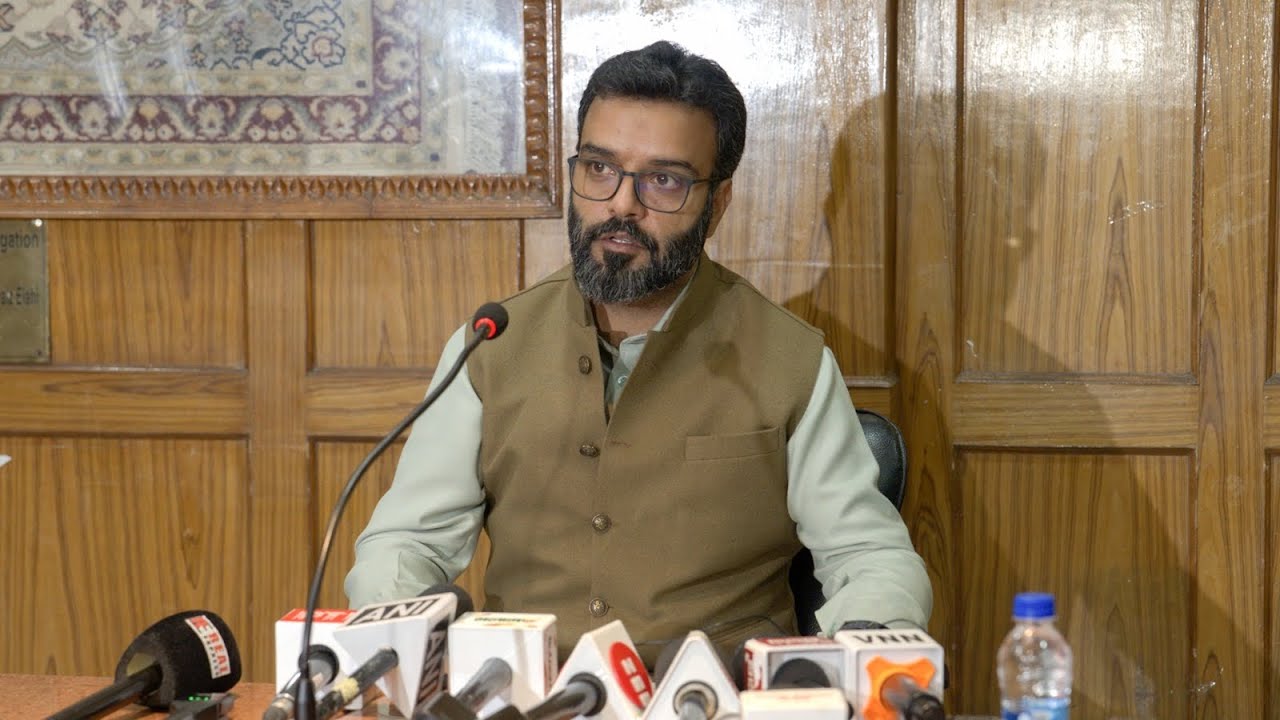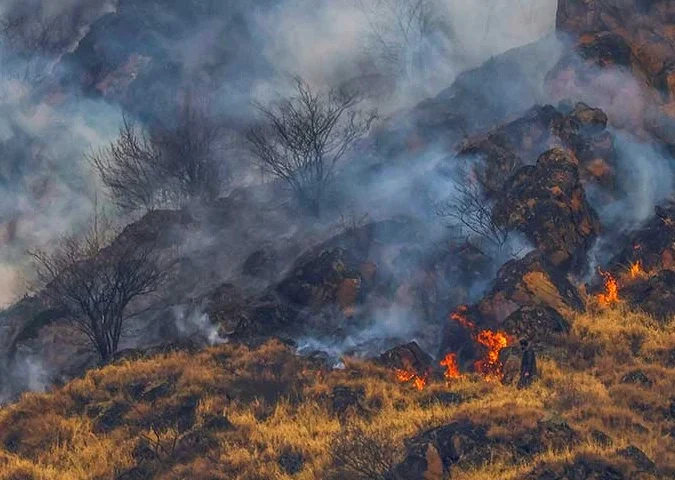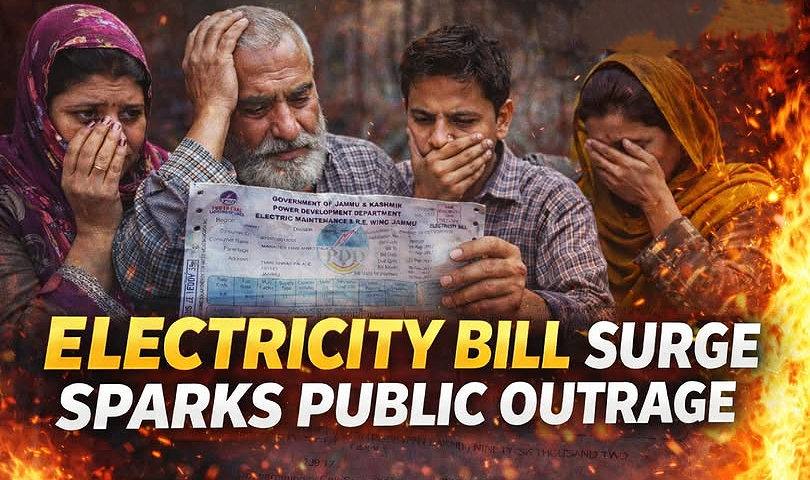Aga Ruhullah Mehdi’s December Deadline Puts Kashmir’s Reservation Controversy on the Boil
By: Javid Amin | 25 November 2025
In a sharp escalation of Kashmir’s ongoing debate over reservation reforms, Srinagar MP Aga Ruhullah Mehdi has delivered a strict ultimatum to the Jammu & Kashmir government: resolve the reservation controversy before the Winter Session of Parliament ends on December 19–20, 2025, or brace for renewed student-led protests.
Speaking with an unusual mix of urgency and defiance, Mehdi warned that he is prepared to sit in protest again—this time for much longer than a day—if the government fails to address what he described as the “suffocating impact” of the current reservation framework on general category youth.
His statement has intensified both street-level anger and internal political tensions, especially within the National Conference (NC), where Mehdi’s direct challenge to the Omar Abdullah–led government marks one of the most public disputes in recent years.
The Ultimatum: December 20, 2025—A Hard Deadline
Mehdi, who recently joined protesting students in Srinagar, has demanded that the government take a decisive call on the rationalisation of reservation.
He has given the administration until December 20, 2025, the final day of the Winter Session of Parliament, to present a solution or roadmap.
His words were pointed:
“This policy is suffocating an entire young generation. If the government continues to ignore their distress, I will be on the streets again—longer and stronger than before.”
Why December 20?
The Winter Session marks the last major political window this year for legislative action. Any failure before this date signals that the government is unwilling—or unable—to recalibrate the reservation policy.
For protesting youth, this deadline has now become a symbolic moment, a line drawn between negotiations and confrontation.
What Mehdi Is Demanding
While Mehdi has not called for dismantling reservation entirely, he insists that:
-
Open Merit (General Category) candidates are being unfairly pushed out.
-
Percentages and categorisations require urgent rationalisation.
-
Core principles of merit have been compromised in recent admissions and recruitment lists.
-
Political ego and bureaucratic rigidity are preventing reform.
He specifically referenced the Vaishno Devi University admissions episode, where many general category students alleged unfair treatment despite higher merit—adding fuel to a fast-growing youth movement.
Background: Why Kashmir’s Youth Are Angry
The reservation question in J&K has been heating up for more than a year.
Key Points of Discontent:
-
Perception of shrinking seats for Open Merit candidates in both education and employment.
-
Multiple overlapping categories that reduce OM seats even further.
-
Claims that bright students are losing out despite scoring higher.
-
Fear that political considerations are overshadowing social justice.
These frustrations erupted into mass student protests over the past months.
Students say:
-
“We aren’t against reservation, we just want fairness.”
-
“Merit is dying.”
-
“This is destroying our future.”
Mehdi’s involvement has given the movement a political voice—and a powerful one.
Tensions Inside the National Conference
Aga Ruhullah Mehdi’s bold stand has not just targeted the government; it has also exposed cracks within the National Conference itself.
The Rift:
-
Mehdi supports protesting youth and criticises the administration’s stance.
-
Omar Abdullah, leading the government, has taken a more cautious approach.
-
Internal NC leaders privately admit this is the “sharpest policy disagreement” between the two.
Political implications:
-
Mehdi’s popularity among youth is rising.
-
Omar Abdullah is caught between governance responsibilities and party image.
-
The NC now faces an internal identity question: Does it stand firmly for merit? For reservation? Or for a middle path?
Mehdi’s Narrative: A Fight for the ‘Suffocated Generation’
Mehdi’s speeches have repeatedly stressed that young people feel trapped, hopeless, and marginalised, not by terrorism or instability but by policy decisions.
According to him:
“The system is pushing talented young people to the wall. Their frustration is real, and ignoring it is dangerous.”
His argument appeals particularly to:
-
Engineering graduates preparing for JE/AE posts
-
Aspiring medical and nursing students
-
Civil service aspirants
-
Lower middle-class youth who rely solely on merit
For this demographic, Mehdi has become the rare politician speaking their language.
Case Study: The Vaishno Devi University Merit Row
A significant flashpoint was the recent admissions issue at the Shri Mata Vaishno Devi University (SMVDU).
What happened:
-
High-scoring general category students failed to get seats.
-
Candidates from other categories reportedly received admissions with significantly lower marks.
-
The incident ignited debates across social media and student groups.
Mehdi cited this case as an example of a system “tilted against genuine merit”.
Streets vs. Parliament: A Potential Showdown
If the government fails to act by December 20, Mehdi has stated he will:
-
Join student protests again
-
Sit for more than 24 hours
-
Mobilise wider support
-
Escalate pressure through public demonstrations
This sets up a potential collision course:
-
Youth movements vs. state administration
-
MP vs. ruling party leadership
-
Merit advocates vs. affirmative action defenders
The government is aware that ignoring this deadline risks reviving mass protests at a politically sensitive time.
How the Government Is Responding
The administration has largely maintained silence, offering only general statements:
-
“The policy is under review.”
-
“We will address all concerns.”
-
“A balanced and fair approach will be adopted.”
However, no concrete policy revision or committee decision has been announced.
Within the NC, some leaders feel Mehdi is acting “emotionally”; others say he is “reflecting ground anger accurately.”
Youth Sentiment: Losing Faith in Institutions
The reservation controversy has deepened a broader sense of institutional distrust among Kashmir’s youth.
Their concerns go beyond quota percentages:
1. Recruitment delays
Exams cancelled, commissions dissolved, repeated re-advertisements.
2. Admission inconsistencies
Different colleges following different interpretations of the rules.
3. Perceived political interference
Parties blamed for “tinkering with merit”.
4. Limited opportunities
With fewer private-sector jobs, government jobs are the only path to stability, making fairness essential.
Mehdi’s stand taps directly into these anxieties.
The Policy Debate: Merit, Equity, and Balance
The government faces a complex challenge:
-
How to ensure opportunities for historically marginalised groups
while -
Preserving the trust of general category youth who feel wiped out
Many policy experts argue that the current structure in J&K is outdated and over-layered, necessitating rationalisation.
But rationalisation itself is politically sensitive.
Why This Ultimatum Matters
1. It may reshape J&K’s reservation framework.
If the administration acts, 2025 could see major reforms.
2. It could trigger the largest youth protests in years.
Student anger is real, organised, and growing.
3. It may redefine Aga Ruhullah Mehdi’s political trajectory.
He is emerging as a major independent voice within NC.
4. It deepens pressure on Omar Abdullah’s government.
Failure to act could hurt public credibility.
5. It could impact the next election cycle.
Merit-based youth voters are increasingly becoming swing voters.
The Road Ahead: What Happens If December 20 Passes With No Action?
If the deadline is missed, several scenarios may unfold:
1. Renewed Protests
Large-scale demonstrations in Srinagar and other districts.
2. Political Polarisation
NC could face an internal debate over Mehdi’s outspoken stance.
3. Public Pressure on the Government
Civil society, student unions, and job aspirants may intensify mobilisation.
4. National Attention
Media coverage could force Delhi to intervene or guide the reforms.
Either way, the countdown has begun.
Final Takeaway
Aga Ruhullah Mehdi’s ultimatum is more than a political statement—it has become the defining battle cry of a generation of Kashmiri youth who feel trapped by a system they consider unfair.
As December 20 approaches, the J&K government faces a stark choice:
Reform or unrest.
The coming weeks will determine whether the reservation debate transforms into a balanced, just policy—or ignites one of the most significant youth-led agitations in recent memory.




